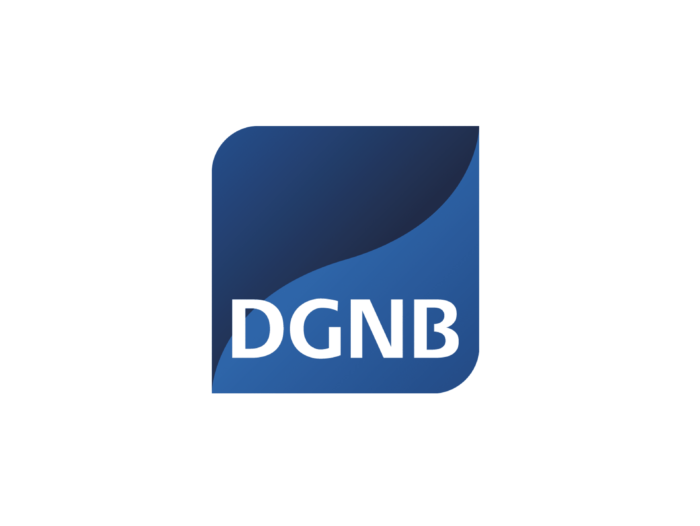DGNB - The German Sustainable Building Council
Find out more about DGNB sustainability certification for buildings here.

DGNB certification
(German Sustainable Building Council)
With the DGNB certificate of the same name, the German Sustainable Building Council (DGNB) has developed a system to make the sustainability of buildings measurable.
The DGNB system is based on the three pillars of sustainability: ecology, economy and social responsibility. Other aspects are also included for a holistic view. Within these areas, points are awarded for various criteria and indicators that are adapted to individual usage profiles and thus make the overall performance of the building assessable.
For which building types is DGNB certification suitable?
Different system variants enable DGNB certification of different building types in different phases of the life cycle:
- Planning (DGNB pre-certificate for new buildings)
- Construction (DGNB certificate for construction sites and new buildings)
- Operation (DGNB certificate for buildings in operation, DGNB recertification for buildings in operation)
- Existing building/conversion/renovation (DGNB certificate for existing buildings and renovation)
- End of life (DGNB certificate for deconstruction)
In principle, the DGNB System is suitable for new buildings, refurbishments and neighborhoods in Germany. The system for new buildings and refurbishments is also available for international use.
The different DGNB system variants are in turn available for different usage profiles. The following can be certified:
- Office and administration building
- Commercial buildings
- Industrial buildings
- Residential building
- Small residential buildings
- Hotel buildings
- Educational buildings
- Healthcare buildings
- Laboratory building
- Mixed use
- Urban quarters
- Office and commercial districts
Building types that have not yet been included in the DGNB System can be certified using the DGNB Flex procedure if necessary. In addition, the DGNB offers certifications for interiors and biodiversity-promoting outdoor spaces, the DGNB Diamond Certification for outstanding design and building culture quality, the DGNB System Future Project (Version 2030) for particularly ambitious existing and new construction projects, the DGNB “Climate Positive” award for buildings that make an active contribution to climate protection, the DGNB Special Ecolabel Award, the DGNB Award for Sustainable Building Sites and ESG verification for the EU Taxonomy.
Award criteria for DGNB sustainability certification
In principle, the DGNB System assesses the performance of a project in the following six environmental categories:
- Ecological quality: resource efficiency, emission avoidance and ecological impact
- Economic quality: life cycle costs, value retention and flexibility
- Sociocultural and functional quality: user comfort, health promotion and functionality
- Technical quality: Technical design, availability and ease of maintenance
- Process quality: planning and construction process, quality control
- Location quality: transport connections, infrastructure and environmental impact at the location
DGNB: Certification body
The German Sustainable Building Council (DGNB) itself is responsible for certification in accordance with the DGNB system.
Costs for DGNB certification
The cost of DGNB certification varies depending on the size of the project, the type of building and DGNB membership status. Typically, the costs are made up of the following components:
- Registration fee: One-off fee to register the project.
- Certification fee: Dependent on the gross floor area (GFA) of the project.
- Consultancy costs: If a DGNB consultant is commissioned.
Why certify with DGNB?
DGNB certification is a voluntary measure that building owners and project developers can choose to assess and prove the sustainability and quality of their buildings, but the added value of sustainability certification cannot be denied:
- A certification intention can be used as a control instrument and thus ensures the quality of the construction project. The certificate makes the high quality of a building visible.
- The growing focus on sustainability is also increasing demand for sustainable buildings from customers, tenants and investors.
- The DGNB system focuses on the entire life cycle of a building, so that processes are optimized from the outset, costs are saved and sustainable decisions are made so that loss of value is avoided.
- Healthy buildings increase the satisfaction, productivity and well-being of users.
Recognition of DGNB sustainability certification in other certification systems
The DGNB sustainability certification is internationally recognized and compatible with systems such as LEED and BREEAM. Cooperation agreements, such as the “Crosswalk” agreement with GBCI, facilitate the mutual recognition of certifications.
The DGNB criteria are also harmonized with the requirements of some other systems or classifications. This means that the DGNB certificate serves as a verification tool for meeting the requirements of the EU Taxonomy, the EU Reporting Framework Level(s) and the United Nations Sustainable Development Goals (SDGs).
Since July 1, 2021, buildings with DGNB certification that meet additional requirements of the Quality Seal for Sustainable Buildings(QNG) have been eligible for funding through the Federal Funding for Efficient Buildings(BEG).
Source: German Sustainable Building Council | DGNB (as of 2024)
Similar entries
- Assessment service now also available for DGNB interiors and EU taxonomy
- Concrete toughening according to the rules of nature – NORSA simplifies sustainable construction with NORTEC
- Building Material Scout at the Drees & Sommer Innovation Journey
- Building Material Scout project coleman 10 awarded the DGNB Gold pre-certificate
- Cradle to cradle – the circular future


